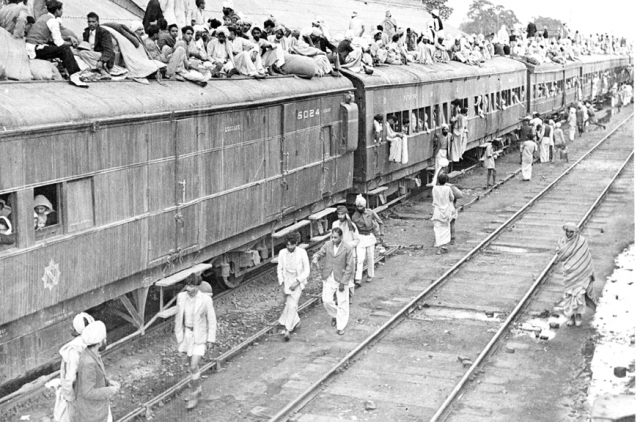The Partition History Project
The Partition of India

Independence & Partition
2017 marks the 70th anniversary of the independence of British India, with territory ‘partitioned’ to create two separate states, India and Pakistan, ostensibly along religious lines. Some welcomed this ‘Partition’, others were dismayed at the outcome. But the passions that Partition unleashed produced deadly inter-communal riots, huge numbers of casualties, and the displacement of around 15 million people (the precise number will never be known). As a newspaper correspondent at the time wrote, train station platforms in the Punjab were “packed with [panic-stricken] Hindu and Sikh refugees waiting despairingly for transport” to what was becoming India, while arriving from the other direction were “Muslims refugees from India … all … with an utterly dazed … air”. Partition was undoubtedly a tragic experience for the hundreds of thousands of ordinary people who died and the many more who were uprooted permanently from their old homes. The harsh truth about what happened, however, is that there was no straightforward division between ‘victim’ and ‘perpetrator’—Hindus, Muslims and Sikhs were all culpable as far as the bloodshed was concerned, and the British colonial state can also be blamed for not anticipating the violent reactions that Partition would generate.
Extremely bitter legacies were the outcome on both sides of the new border, and these were then further stoked by the hot and cold wars that India and Pakistan have fought over the following 70 years. Stories of Partition brutality therefore still divide communities, even among those now living in the UK, reinforcing deeply problematic notions that Hindus, Sikhs and Muslims remain separated by sharply-defined boundaries and fundamentally opposed interests. Yet also threaded through Partition’s traumatic events were more positive encounters when people from different religious faiths helped others to survive the dangers that Partition's deadly fallout posed.
It is precisely the opportunity to use the 70th anniversary as the starting point for a process of reconciliation that drives ‘The Partition History Project’. Bringing together school teachers, interfaith groups, arts practitioners and academic historians, it seeks is to raise understandings of Partition in UK schools, and, by doing so, to overcome the negative legacies dating from 1947 that linger into the present. After all, alongside the perpetrators of violence, there were members from across the communities who acted in humane ways under extremely difficult circumstances: as one account has put it, "buried under the debris of the violence and pain of Partition is an enormous story of help, humanity and harmony". By drawing attention to the shared human experiences, in both the short and longer terms, ‘The Partition History Project’ hopes to transform historical sensitivities and suspicions into something much more positive and less divisive, with resonance for young people from a range of backgrounds in the UK today.
For more details contact Farah Elahi at: farah@runnymedetrust.org
Attached files:
- Start teaching the history of India and Pakistan
154.4 KB PDF document

